ICC fugitive Netanyahu launches missile strike on Iran
 Israel has just launched missile strikes on Iran, including attacks on Iran's Natanz nuclear enrichment program which is under a mountain, and other military targets.
Israel has just launched missile strikes on Iran, including attacks on Iran's Natanz nuclear enrichment program which is under a mountain, and other military targets.
 Israel has just launched missile strikes on Iran, including attacks on Iran's Natanz nuclear enrichment program which is under a mountain, and other military targets.
Israel has just launched missile strikes on Iran, including attacks on Iran's Natanz nuclear enrichment program which is under a mountain, and other military targets.
 The corporate takeover of Ukrainian land from about 2011 up to and during the Ukraine war is extremely immoral, corrupt, cruel and disenfranchising. I understand it as a process of privatisation, corporatisation and debt, which means ultimately that Ukraine is no longer governed by its people, but by corporates and oligarchs.
The corporate takeover of Ukrainian land from about 2011 up to and during the Ukraine war is extremely immoral, corrupt, cruel and disenfranchising. I understand it as a process of privatisation, corporatisation and debt, which means ultimately that Ukraine is no longer governed by its people, but by corporates and oligarchs.
 Students for Palestine are launching the People’s Inquiry into Free Speech on Palestine at Australian Universities in collaboration with other organisations, groups, and prominent individuals around the country, including the Australian Greens and the Australian Palestine Advocacy Network (APAN).
Students for Palestine are launching the People’s Inquiry into Free Speech on Palestine at Australian Universities in collaboration with other organisations, groups, and prominent individuals around the country, including the Australian Greens and the Australian Palestine Advocacy Network (APAN).
 If you haven't come across Sean Foo before, you are in for a treat. His economic, politically focused analyses, are usually brilliant. He approaches the world with an open mind and seems able to grasp a big picture. His take on Marine Le Pen's National Rally, and the clips he illustrates her policies with, are extremely well-chosen. It is also worth reading the comments under his video.
If you haven't come across Sean Foo before, you are in for a treat. His economic, politically focused analyses, are usually brilliant. He approaches the world with an open mind and seems able to grasp a big picture. His take on Marine Le Pen's National Rally, and the clips he illustrates her policies with, are extremely well-chosen. It is also worth reading the comments under his video.
 Public expenditure must instead address the climate emergency and other urgent social needs. There is no evidence that China presents a military threat to Australia. Continued trade and pursuit of mutually beneficial relations in our region offers our best security.
Public expenditure must instead address the climate emergency and other urgent social needs. There is no evidence that China presents a military threat to Australia. Continued trade and pursuit of mutually beneficial relations in our region offers our best security.
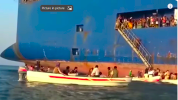 It's a relief to see Yemen use intelligence and a sense of humour to bring pressure on Israel and its backers' vicious attempts to obliterate Gaza-Palestine! Yemenis are now taking boatloads of tourists to sight-see on the Galaxy Leader, the part-Israeli-owned ship they captured on 19 November. You can also see them dancing in a line on its deck, here.
It's a relief to see Yemen use intelligence and a sense of humour to bring pressure on Israel and its backers' vicious attempts to obliterate Gaza-Palestine! Yemenis are now taking boatloads of tourists to sight-see on the Galaxy Leader, the part-Israeli-owned ship they captured on 19 November. You can also see them dancing in a line on its deck, here.
 Russia is ready for confrontation with NATO – Putin. Moscow does not want a conflict with the Western-led bloc but is ready for any outcome, Russian president says
Russia is ready for confrontation with NATO – Putin. Moscow does not want a conflict with the Western-led bloc but is ready for any outcome, Russian president says
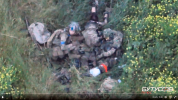 Look at this footage and ask yourself why Australian PM Albanese just sent another 70 armoured vehicles to Ukraine. For what? There are no good answers, but Mr Albanese isn't likely to find himself with his legs blown off in Ukraine-Russia, struggling on his elbows for the shelter of the last tank, although that is where he and the other US-NATO supporters should all be sent.
Look at this footage and ask yourself why Australian PM Albanese just sent another 70 armoured vehicles to Ukraine. For what? There are no good answers, but Mr Albanese isn't likely to find himself with his legs blown off in Ukraine-Russia, struggling on his elbows for the shelter of the last tank, although that is where he and the other US-NATO supporters should all be sent.
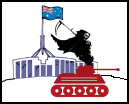 "Clear need to improve the transparency and accountability of government decision-making in relation to armed conflict.' "Require a written statement to be published and tabled in the Parliament setting out the objectives of major military operations, the orders made and legal basis"; "Facilitate debate ..."
"Clear need to improve the transparency and accountability of government decision-making in relation to armed conflict.' "Require a written statement to be published and tabled in the Parliament setting out the objectives of major military operations, the orders made and legal basis"; "Facilitate debate ..."
 Australia's decision to add weapons [1] to the Ukraine pyre shows our government is unable to critically formulate foreign policy.
Australia's decision to add weapons [1] to the Ukraine pyre shows our government is unable to critically formulate foreign policy.

 For readers who wonder whether Nazi activity in Ukraine is exaggerated: "[...] Beginning in 2014, when the Maidan uprising brought a new government to Ukraine, the country has been erecting monuments to Nazi collaborators and Holocaust perpetrators at an astounding pace — there’s been a new plaque or street renaming nearly every week.
For readers who wonder whether Nazi activity in Ukraine is exaggerated: "[...] Beginning in 2014, when the Maidan uprising brought a new government to Ukraine, the country has been erecting monuments to Nazi collaborators and Holocaust perpetrators at an astounding pace — there’s been a new plaque or street renaming nearly every week.
 While westerners are sending money to help Ukrainians, their elites are joyfully raiding Russian assets. This article is partly to explain a cartoon I recently published which apparently mystified a number of people. It pictured a pirate galleon called US-NATO with a crew talking about the treasure they had stolen from Russia, where a cartoon Biden asks a cartoon Victoria Nuland: "How much have we shaken Russia down, so far, Mrs Nuland?" and Nuland replies, "Well, let’s see.
While westerners are sending money to help Ukrainians, their elites are joyfully raiding Russian assets. This article is partly to explain a cartoon I recently published which apparently mystified a number of people. It pictured a pirate galleon called US-NATO with a crew talking about the treasure they had stolen from Russia, where a cartoon Biden asks a cartoon Victoria Nuland: "How much have we shaken Russia down, so far, Mrs Nuland?" and Nuland replies, "Well, let’s see.
 Clare Daly is an Irish Member of the European Parliament (MEP). Here is a transcript and video of her speech of 6 April 2022.
Clare Daly is an Irish Member of the European Parliament (MEP). Here is a transcript and video of her speech of 6 April 2022.
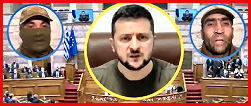 (See Alex Christoforou's video commentary inside.) Why did Ukrainian President Zelensky appear before the Greek Parliament, with a Nazi soldier from Ukraine's Azov Batallion? Have Ukrainian Nazis grown tired of fighting a hopeless war in the background, while Zelenski is lionised, and now seek the limelight and recognition for their sacrifices? Zelensky described the soldiers appearing with him as courageous, noting the Greek origins of one of them.
(See Alex Christoforou's video commentary inside.) Why did Ukrainian President Zelensky appear before the Greek Parliament, with a Nazi soldier from Ukraine's Azov Batallion? Have Ukrainian Nazis grown tired of fighting a hopeless war in the background, while Zelenski is lionised, and now seek the limelight and recognition for their sacrifices? Zelensky described the soldiers appearing with him as courageous, noting the Greek origins of one of them.
We have repeatedly mentioned facts about the atrocities of nationalists terrorizing civilians for any disobedience or attempts to leave settlements.
Today, footage of civilians killed in Chernihov, who were supposedly “shot by Russian servicemen,” was circulated on all propaganda resources of the Kiev regime. It was stated that all victims were allegedly queuing for bread.
I would like to stress the absence Russian servicemen in Chernihov.
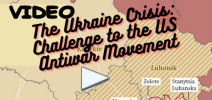 Interesting and informative speeches from all over the world. Speakers: Joe Lombardo (UNAC), Patricia Gorky (ANSWER Coalition), Rhonda Ramiro (BAYAN USA), Jacqueline Luqman (Black Alliance for Peace), Rick Sterling (Task Force on the Americas, Veterans For Peace), Judy Greenspan (International Action Center), Jeff Macker (UNAC West Coast)
Interesting and informative speeches from all over the world. Speakers: Joe Lombardo (UNAC), Patricia Gorky (ANSWER Coalition), Rhonda Ramiro (BAYAN USA), Jacqueline Luqman (Black Alliance for Peace), Rick Sterling (Task Force on the Americas, Veterans For Peace), Judy Greenspan (International Action Center), Jeff Macker (UNAC West Coast)
Mike Pezzullo, Federal Government Home Affairs Department Secretary, a public servant, talked up war in an Anzac Day speech on 26 April 2021.
He was referring to China's ambitions to integrate Taiwan as a federation within mainland China government, by force or persuasion.
He cited Australia's 70 year old ANZUS alliance with the United States and New Zealand as a.
Finally, obscenely, he spoke of sending off, "yet again, our warriors to fight."
What kind of fight do a few Australian 17 or 18 year olds have with nuclear weapons and a Chinese army more than 2 million strong? What kind of war can you have to save "our precious liberty" from 'communism' [last I saw, China was a capitalist dictatorship] without simultaneously incinerating the rest of the planet, these days?
[Look up New Zealand's ideas on this]
One of Australia’s most powerful national security figures says free nations “again hear the beating drums” of war, as military tensions in the Indo-Pacific rise.
In an Anzac Day message to staff, Home Affairs Department Secretary Mike Pezzullo said Australia must strive to reduce the likelihood of war “but not at the cost of our precious liberty”.
Mr Pezzullo also invoked the memory of two United States war generals and warned this nation must be prepared “to send off, yet again, our warriors to fight”.
Amid growing military tensions between China and the US over Taiwan, the powerful bureaucrat also highlighted the “protection afforded to Australia” by its 70-year-old ANZUS military alliance with the US and New Zealand.
“Today, as free nations again hear the beating drums and watch worryingly the militarisation of issues that we had, until recent years, thought unlikely to be catalysts for war, let us continue to search unceasingly for the chance for peace while bracing again, yet again, for the curse of war,” Mr Pezzullo said on Monday.
“War might well be folly, but the greater folly is to wish away the curse by refusing to give it thought and attention, as if in so doing, war might leave us be, forgetting us perhaps.”
He drew on an address given by US Army General Douglas MacArthur at the West Point Military academy in 1962, where he reminded cadets “their mission was to train to fight and, when called upon, to win their nation’s wars – all else is entrusted to others”.
Similarly, Mr Pezzullo also invoked former Army General and US President Dwight D. Eisenhower who, he said, in 1953 “rallied his fellow Americans and its allies to the danger posed by the amassing of Soviet military power, and the new risk of militaristic aggression”.
“Throughout his presidency, Eisenhower instilled in the free nations the conviction that as long as there persists tyranny’s threat to freedom they must remain armed, strong and ready for war, even as they lament the curse of war,” he said.
“Today, free nations continue still to face this sorrowful challenge.
“In a world of perpetual tension and dread, the drums of war beat – sometimes faintly and distantly, and at other times more loudly and ever closer.”
"Key bureaucrat warns ‘drums of war are beating’ as China flexes its muscles over Taiwan," The New China Daily, , 27 April 2021. https://thenewdaily.com.au/news/national/2021/04/27/australia-china-drums-war/?fbclid=IwAR3XSL4LRGmj_pOG5nFT5JkNLjPhrVVbaX1kmTMylQDO5uy1urwP6YE5gL4a.
 Video inside with Ian Lowe talking on the impact of war on carbon gas production, and Peter Catt asking for people's views on the connection between war and refugees. The general public is invited to give their opinion in this democratic inquiry. The Independent and Peaceful Australia Network (IPAN) is a national network of community, peace and faith organisations, environment groups, trade unions and individuals concerned about the social, economic, environmental, military and political costs of Australia’s involvement in US-led wars. IPAN advocates an independent and peaceful Australian foreign policy. IPAN is conducting a broad People’s Inquiry examining the costs and consequences of Australia’s involvement in US led wars and the US alliance.
Video inside with Ian Lowe talking on the impact of war on carbon gas production, and Peter Catt asking for people's views on the connection between war and refugees. The general public is invited to give their opinion in this democratic inquiry. The Independent and Peaceful Australia Network (IPAN) is a national network of community, peace and faith organisations, environment groups, trade unions and individuals concerned about the social, economic, environmental, military and political costs of Australia’s involvement in US-led wars. IPAN advocates an independent and peaceful Australian foreign policy. IPAN is conducting a broad People’s Inquiry examining the costs and consequences of Australia’s involvement in US led wars and the US alliance.
The Inquiry aims to give a voice to the community and increase public discussion on the social, economic, financial, environmental and political impacts. It seeks to inform and promote debate in the Australian community. The national Inquiry invites organisations and community members to make submissions on their views and concerns. We also invite submissions offering alternatives for the future. We are keen to develop a coherent and persuasive case for an independent and peaceful Australian foreign policy, and military and defence spending priorities. (See here for earlier information about the inquiry.)
The Inquiry deals with 8 key areas:
• Impact on First Nation Peoples
• Social and Community (Health, Education, Community & Welfare, Housing)
• Union and Workers’ Rights (Job security, workers’ rights, defence and sustainable industries)
• Environment and Climate Change
Military and Defence
Foreign Policy
Economic
Political, including Democratic Rights
For more information about the Inquiry, How to submit, Inquiry Background Paper, Terms of Refence please go to the People's Inquiry webpage: https://Independentpeacefulaustralia.com.au/
We are also offering you/your organisation a face-to-face or online presentation and discussion on the Inquiry and how to submit. If you are interested please feel free to contact us to arrange a time.
Submissions to the Inquiry will be reviewed by a panel of experts chaired by lawyer and investigative journalist, Kellie Tranter, and used to prepare a report on the impact to Australians, of the military alliance with the United States and involvement in wars of the past 70 years, from Korea to Afghanistan (where Australian personnel are still deployed). This report will be widely promoted and publicised in the community, the media, in parliament, amongst politicians and public figures.
With the escalating US-China tensions, the Inquiry report will share your views and suggestions for alternatives to our current predicament.
A submission can be one paragraph or up to 5,000 words. Please also pass this on to anyone whom you think may be interested.
We very much hope that you will be able to fit this important task into your busy schedule.
With best wishes,
IPAN-Victoria Representatives
On behalf of the Independent and Peaceful Australia Network
The Duran’s Alex Christoforou and Editor-in-Chief Alexander Mercouris discuss the meeting in Moscow between Russian President Putin and Turkey's Erdogan. Erdogan made many outrageous claims, including that Turkey had killed over 2,500 Syrian troops during fighting in Idlib's surrounding areas...a claim which is ridiculous on its face, and exposes how out of touch the Turkish leader is when it comes to this reckless invasion of Syrian sovereignty. See more at The Duran: https://theduran.com
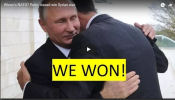 Russian President Vladimir Putin met his Syrian counterpart Bashar al-Assad in Sochi on 21st November 2017. The last time Assad visited Russia was at the beginning of the Russian campaign in Syria in 2015. According to the Syrian president, in two years of the Russian campaign the successes achieved have been evident and many residents of the country were able to return to their homes. He noted that thanks to Russia, Syria was saved as a state. (Text by Inessa S.)
Russian President Vladimir Putin met his Syrian counterpart Bashar al-Assad in Sochi on 21st November 2017. The last time Assad visited Russia was at the beginning of the Russian campaign in Syria in 2015. According to the Syrian president, in two years of the Russian campaign the successes achieved have been evident and many residents of the country were able to return to their homes. He noted that thanks to Russia, Syria was saved as a state. (Text by Inessa S.)
The Chief of the Russian Armed Forces General Staff, Valeri Gerasimov, said conditions have been created for the return of refugees to Syria, during the trilateral meeting with his Turkish and Iranian counterparts in Sochi. "The main thing is that the sovereignty, the territorial integrity of the country has been preserved, the civil war was stopped, conditions were created for the restoration of peaceful life and refugees' return," said Gerasimov.
President Putin similarly told his Czech counterpart, Milos Zeman, that "over 98% of the territory of Syria is under the control of Syrian government troops, during their meeting in Sochi. Zeman congratulated Russia for its role in the outcome in Syria, saying: "you have won in Syria, because he [Assad] now controls almost the entire Syrian territory."
The Russian military campaign in Syria began in late 2015, by invitation of the Syrian government. Meanwhile, the Western coalition was carrying out military activity there almost two whole years beforehand, illegally. Under the guise of fighting ISIS, they were simultaneously targeting Assad’s government forces, as well as letting ISIS spread like wildfire.
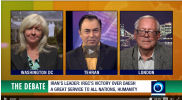 President Assad and President Putin met on 21st of November to celebrate the defeat of Daesh in Syria, but we hear little of this in the western media, which is distracting people with Hollywood scandals. In this brilliantly documented episode of The Debate, Iranian Press TV has conducted an interview with Janice Kortkamp, a journalist from Washington, and Jonathan Fryer, a London-based writer and lecturer, to discuss "the end of Daesh" terrorist group in Syria and Iraq.
President Assad and President Putin met on 21st of November to celebrate the defeat of Daesh in Syria, but we hear little of this in the western media, which is distracting people with Hollywood scandals. In this brilliantly documented episode of The Debate, Iranian Press TV has conducted an interview with Janice Kortkamp, a journalist from Washington, and Jonathan Fryer, a London-based writer and lecturer, to discuss "the end of Daesh" terrorist group in Syria and Iraq.
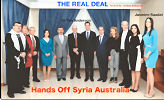 Inside, two interviews with Dr Tim Anderson, Sydney academic, on Syria. The first is by Channel 7 on 24 January 2014 and shows incredible bias. The second is by Journalist Joshua Blakeney, who interviewed Anderson and Hands Off Syria's Jasmine Saadat about their recent visit to Syria where they met with Syrian officials including the President of Syria Bashar al-Assad. The interview was conducted at a time when the pro-war Australian press was attempting to discredit members of Hands Off Syria Australia for meeting with members of the Syrian government. See inside for videos.
Inside, two interviews with Dr Tim Anderson, Sydney academic, on Syria. The first is by Channel 7 on 24 January 2014 and shows incredible bias. The second is by Journalist Joshua Blakeney, who interviewed Anderson and Hands Off Syria's Jasmine Saadat about their recent visit to Syria where they met with Syrian officials including the President of Syria Bashar al-Assad. The interview was conducted at a time when the pro-war Australian press was attempting to discredit members of Hands Off Syria Australia for meeting with members of the Syrian government. See inside for videos.This is supplied to readers of candobetter.net in order to balance Channel 7's ridiculously biased interview with Tim Anderson, which you may access here. 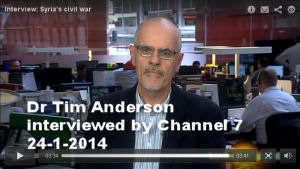
The second (larger picture) is the link to the longer and more intelligent interview.
The interview was recorded on January 12, 2014 and can be found archived on The Real Deal radio show's blog: http://radiofetzer.blogspot.ca
There's an excellent article by the ever-reliable McClatchy News, analysing the various 'inconsistencies and hinges' in the Obama administration's 'red line' case against Syria. In the light of the latest allegations by French intelligence services, it raises several unanswered and often unasked questions:
by Matt
1. Why would Syria carry out a chemical weapons attack in its capital, within 72 hours of the arrival of the UN Inspection Team, which it had invited to the country to investigate the earlier alleged use of chemical weapons?
2. Which of the UN Security Council members agreed to limit the mandate of the Weapons Inspection team to investigating whether chemical weapons attack had taken place, but not their provenance?
3. According to the case presented by Kerry, the US had 'collected streams of human, signals and geospatial intelligence”' that showed the Syrian regime preparing for an attack three days before it took place. Why didn't the administration issue a public warning beforehand in an attempt to prevent it?
4. Why did the US immediately seek to undermine the UN Weapons Inspection team when news of the Ghouta attack first became public, by declaring that any further investigation would be irrelevant and 'too late'?
5. Sarin gas traces can last not only for months, but for years. Why have the US, Britain and France insisted that any evidence at Ghouta will have been destroyed by the regime or become 'degraded' and therefore useless to the UN Inspectors - a barefaced, flat out lie?
6. The US and France claim to have collected traces of sarin in samples of hair and blood from first responders that were 'provided to the United States.' How were these samples collected and why were they provided to the US and not the UN?
7. What explains the huge discrepancy between the alleged casualty figures provided by the US, Britain and France?
8. Why has the US insisted that the rebels have no chemical weapons capability, even though Carla del Ponte, a senior member of the UN Independent Commission of Inquiry on Syria claimed in May that UN investigators in May had found ' strong, concrete suspicions but not yet incontrovertible proof' that rebel forces may have used them?
9. Is there any truth in the reports by the MintPress News that Saudi-backed rebels may inadvertently have set off a sarin gas explosion?
10. Do the US and its allies actually want a full, scientifically-based, independent investigation into what happened at Ghouta, or are they merely ignoring any contrary facts that contradict their allegations and using stitched-up 'intelligence' information as a pretext for 'humanitarian' bombing?
Matt | September 3, 2013 at 8:22 am | URL: http://wp.me/p1wQsg-IJ
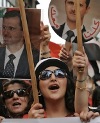
As a result of the wars and sanctions against Iraq since 1990, found by the UK Government's own Chilcot Inquiry in 2012 to have been illegal, 3.3 million Iraqis have died and many more have fled, including 1.2 million to Syria, according to Wikipedia. Knowing that the same people who invaded Iraq, Afghanistan and Libya are now arming, supplying and paying the so-called "Free Syrian Army" (FSA), Syrian patriots are fighting hard against the FSA killers -- and winning.
Please attend a public meeting at 7.30PM on Wednesday 6 March for peace in Syria at the Unitarian Church, 110 Grey Street, East Melbourne. (The previously advertised time of 6.30PM was wrong. Our apologies.)
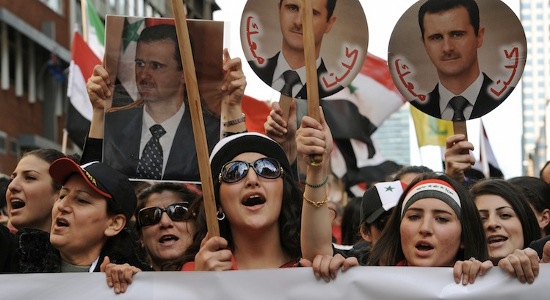
In order to boost the numbers of fighters, sadly depleted by almost two years of savage fighting, Syrian women are now being enlisted into the armed forces as shown in this YouTube video on the Syrian Girl Partisan's YouTube channel. This channel is an excellent resource with which to arm yourself against lies from the mainstream media such as the Guardian article Brothers in arms: the 10 brothers fighting for the Syrian uprising of 22 February by Martin Chulov.
If you live close to Melbourne Victoria, please attend a public meeting for Peace in Syria.
Venue: Melbourne Unitarian Church Hall, 110 Grey Street, East Melbourne
Date: Wednesday 6 March
Time: 6:30PM
Originally published on Global Research TV (http://tv.globalresearch.ca, grtv) on 28 Feb 2013
They say that big ideas start from humble beginnings. In the pantheon of ideas, perhaps there is none bigger than the quest to criminalize war. The concept itself is difficult for many to process at first. It does not mean to uphold some mere code of war conduct, making certain atrocities committed during times of war punishable as “war crimes,” as in the Geneva Convention. Instead, the concept of criminalizing war seeks to make warfare itself a crime, punishable as an offense no matter when or how it is waged or under what pretext.
Originally published on Global Research TV (http://tv.globalresearch.ca, grtv) on 28 Feb 2013
They say that big ideas start from humble beginnings. In the pantheon of ideas, perhaps there is none bigger than the quest to criminalize war. The concept itself is difficult for many to process at first. It does not mean to uphold some mere code of war conduct, making certain atrocities committed during times of war punishable as “war crimes,” as in the Geneva Convention. Instead, the concept of criminalizing war seeks to make warfare itself a crime, punishable as an offense no matter when or how it is waged or under what pretext.
For many in the anti-war movement in the Western world, completely demoralized by the utter abandonment of the movement by many on the pro-war left who are unwilling or unable to criticize Obama’s avid pro-war policies, the idea of criminalizing war will seem a pipe dream, no more realistic than the idea of stopping all violence in the world or making everyone a millionaire. This is precisely the problem. The long-time activists and campaigners have become so disillusioned that they no longer even try to implement the changes they would really like to see take place in the world. The weight of their experiences has taught them to be grateful for small advances here and there, and to expect that big changes can never happen.
In stark contrast to the jaded views of older generations stands the idealism of youth, an idealism that the older generation, predictably enough, tends to dissuade by urging those youth to “grow up” and “face reality.” However, late last year the first seeds of a new anti-war movement were planted in Malaysia, a movement that seeks to shape the world in the image of that ideal society not by dissuading youthful idealism, but by fostering it.
The concept was unveiled at the International Conference on War-Affected Children which took place at the Putra World Trade Centre on November 22nd last year. Attended by dignitaries including former Malaysian Prime Minister Mahathir Mohamad and current PM Najib Razak, the event sought to draw attention to the plight of children in war-torn countries around the world.
The event also saw the launch of a new initiative by the Kuala Lumpur Foundation to Criminalize War. Called “Criminalise War Clubs,” the aim is to encourage the development of independent, student-run organizations around the idea of criminalizing war. The organization’s charter was formally signed by the Prime Minister and other dignitaries, and the first two chapters of what is planned to be a global phenomenon were started with a reading of the charter.
The charter calls for wars of aggression to be criminalized, for states and governments to protect children in armed conflicts, and for banning the participation of children in wars.
In an exclusive interview with Global Research TV, former Malaysian Prime Minister Mahathir Mohamad talked about the clubs, and what they hope to achieve.
The clubs are just one program spearheaded by the Kuala Lumpur Foundation to Criminalise War, the non-governmental organization founded by Mahathir Mohamad in 2007. Its other initiatives include the Kuala Lumpur War Crimes Commission, comprised of scholars, lawyers and high-ranking officials from around the world, and the Kuala Lumpur War Crimes Tribunal, which successfully prosecuted George Bush, Dick Cheney, and others last year for their participation in war crimes in the war on terror.
Last November I talked to G.S. Kumar, the Editor of Criminalise War, about Mahathir Mohamad’s vision, and the promise that initiatives like the Criminalise War Clubs offer.
There is, of course, no guarantee that initiatives like these will pay off in the future. Whether or not human civilization will ever be able to envision a way to resolve their differences without recourse to war is a question that has yet to be definitively answered. But if we do not continue to pose that question, then surely no answer will be possible. And given the stakes of the conflicts raging across the globe today, and the possibility of nuclear war, or war waged with even more advanced technologies, the need to answer this question has never been greater.
To be sure, there is a vast chasm between the world we currently live in and one in which war itself is outlawed. No one is pretending otherwise. But it is clear at this point that if that ideal is ever to be realized, it will not be presided over by the current generation of disillusioned cynics in the burnt-out wreckage of today’s demoralized anti-war movement, but by a generation yet untouched by that disillusionment.
If it is indeed true that big ideas have humble beginnings, then it would be harder to think of a bigger idea, or a more humble origin.
Recent comments